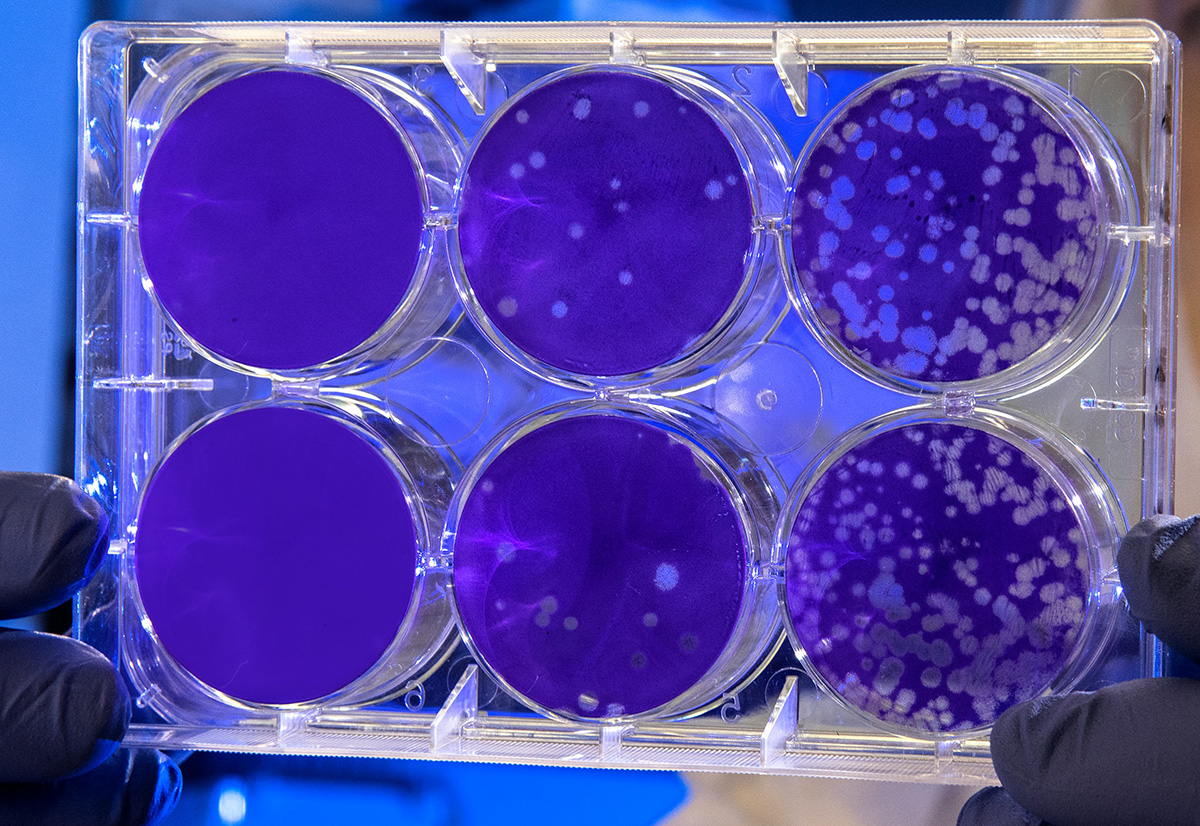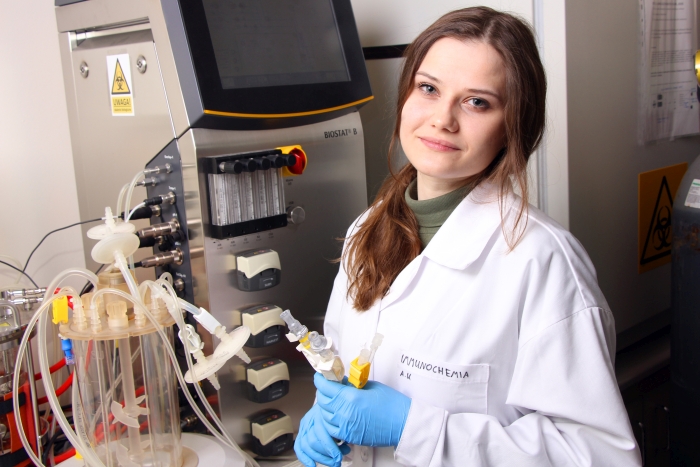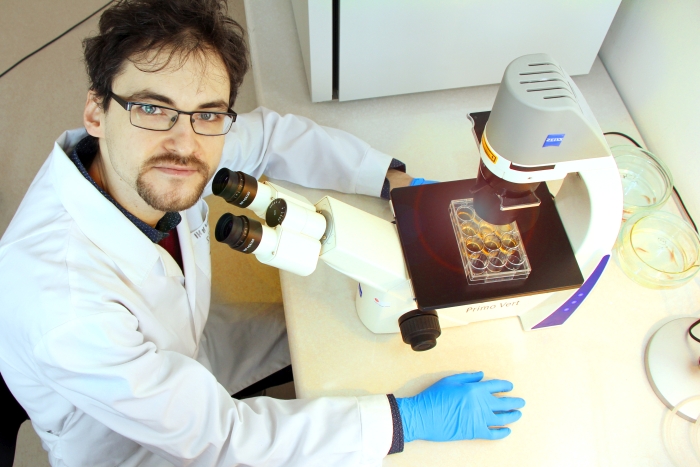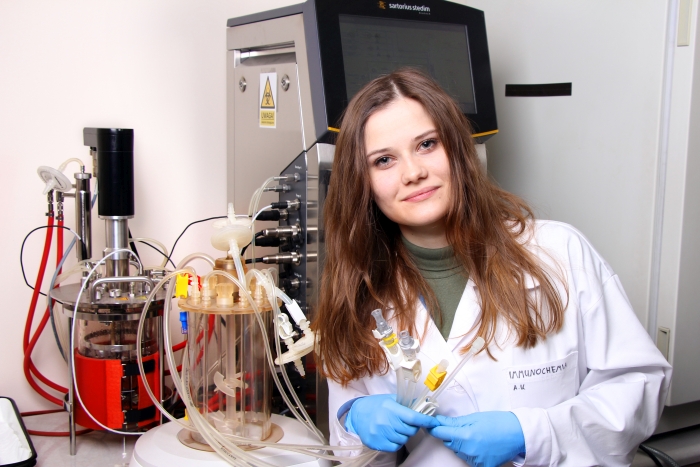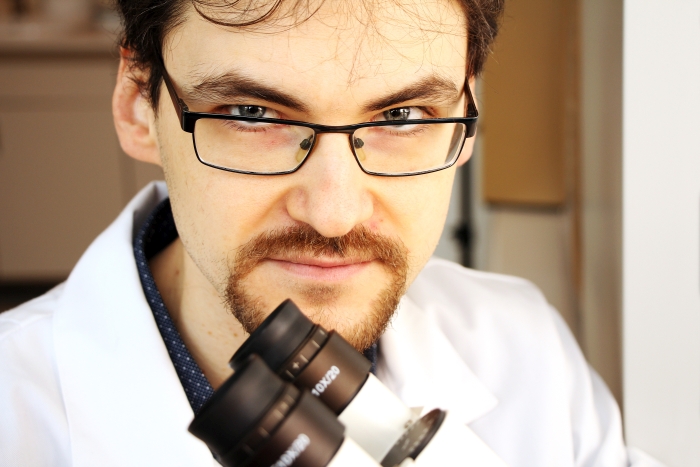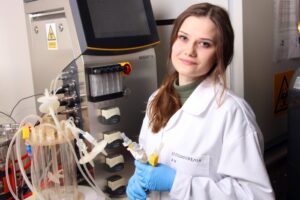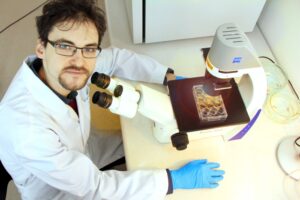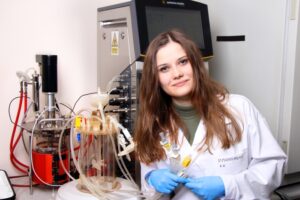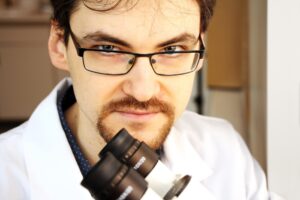The Laboratory of Glycobiology looks into the roles of glycans: glycoproteins and glycolipids in intracellular interactions and pathogen interactions, such as with bacterial toxins and the malaria parasite merozoites. At the Laboratory, the molecular bases of blood group differentiation are also investigated.
The current research topics are:
- Role of glycophingolipids and glycoproteins of the human P1PK blood group system in bird resistance against Shiga toxins.
- Influence of N-glycosylation on the activity of the human Gb3/CD77 synthase, a glycosyltransferase synthesizing the P1PK blood group system antigens.
- Role of sialic acids (NeuAc and NeuGc) as receptors in the specific recognition of host erythrocytes by the Plasmodium parasites which infect primates.
- Role of glycosylation in the emergence of animal multicellularity.
Laboratory Head: Professor dr hab. Marcin Czerwiński (0000-0003-2859-3699)

Professor Marcin Czerwiński is an alum of the Department of Chemistry at Wrocław University of Science and Technology, from which he graduated in 1982. He has worked at the Institute since 1983, and in 1991 he received his doctorate in the field of Natural Sciences – Biology with a specialization in Biochemistry. His Thesis, written under the supervision of Prof. Elwira Lisowska, was entitled “Research on the degradation of anion receptor from human erythrocytes using a monoclonal antibody”.
Between 1992 and 1994 he worked on a fellowship at the University of Pennsylvania in Philadelphia (PA, USA). In 2003 he received his habilitation degree for the Thesis “Molecular characterization of monoclonal antibodies recognizing the human glycophorin A”. In 2016 he received a Professorship in Biological Sciences and from 2017 he leads the Laboratory of Glycobiology at the Hirszfeld Institute of Immunology and Experimental Therapy, PAS.
Marcin Czerwiński has co-authored 74 publications and 79 conference proceedings. To date, he has supervised 6 BSc students, 21 MSc students and 5 PhD students and was the Principal Investigator of 6 grants from the Polish Ministry of Science and Higher Education/State Committee for Scientific Research/National Science Centre. His research interests concentrate around glycobiology and molecular biology of blood group antigens of humans and other animals.
Scientific Staff:
- prof. Ewa Jaśkiewicz, Professor (0000-0001-9746-6576)
- Łukasz Sobala, PhD, Eng, Assistant Professor (0000-0002-3807-6452)
- Radosław Kaczmarek, PhD, Assistant Professor (currently on a scholarship in the US)
- Krzysztof Mikołajczyk, PhD, Assistant Professor (0000-0003-1879-2205)
- Katarzyna Szymczak-Kulus, PhD, Assistant (0000-0003-2660-3662)
Specialists:
- Anna Bereźnicka, PhD
- Maria Banaś
PhD Students:
- Marlena Jodłowska, MSc
- Patrycja Burzyńska, MSc
- Demonstration that the NOR blood group antigen, the NOR polyagglutination factor (agglutination here means erythrocytes being glued together by antibodies from other people) emerges from a point mutation in the human Gb3/CD77 synthase gene, which changes the amino acid residue 211 from glutamine to glutamic acid. An enzyme with this amino acid substitution gains an ability to synthesize the rare NOR antigen (2012).
- Determination of the specificity of human Gb3/CD77 synthase and demonstration that the enzyme synthesizes three types of glycosphingolipid antigens, according to the rule “one enzyme, three antigens, four phenotypes”. In addition, the activity of the enzyme is influenced by the conjugated N-glycans at two sites (N121 and N203) – when absent, the enzyme is not localized correctly (2016, 2020).
- Demonstration that glycophorins C and D are receptors of the EBA-140 ligand from Plasmodium falciparum and Plasmodium reichenowi, which cause malaria in, respectively, humans and chimpanzees (2017, 2019).
- Investigation of cell glycoproteins and glycosphingolipids as receptors for pathogens (Plasmodium falciparum) and toxins (Shiga toxin): flow cytometry, surface plasmon resonance (SPR), Western blotting, ELISA, thin layer chromatography (TLC), mass spectrometry.
- Analysis of glycosyltransferase activity: site-directed mutagenesis, production of enzymes in various expression systems (Sf9 and HighFive, Leishmania tarentolae, HEK293 cells) and their purification, kinetics, donor and acceptor affinity analysis using synthetic oligosacharides.
- Glycomic analyses of protists and animals: phylogenetics, glycogenomics, culturing and transfection of organisms from families: Capsaspora, Salpingoeca and Nematostella.
- Molecular biology: PCR thermocyclers, protein and DNA electrophoresis equipment, camera for visualizing agarose gels, PAA gels and membranes (G-Box), ELISA reader, luminescence reader, spectrophotometer, bacterial culture incubators.
- Tissue culture: CO2 incubators for mammalian tissue culture, thermostatic incubators with optional mixing for insect cells and protists, laminar flow chambers, cell counter (Adam), brightfield and fluorescence microscopes.
- Glycolipid analysis: rotary evaporator, dry nitrogen flow concentrator, heating incubators.
- MNiSW (Ministry of Science and Higher Education) grant no. N302 281436 (2009-2013): Characterization of structure and ligand binding of Plasmodium falciparum (BAEBL) to its receptor (glycophorin C) on human erythrocytes with the aim of inhibiting the malaria parasite invasion. PI: dr hab. Ewa Jaśkiewicz.
- MNiSW (Ministry of Science and Higher Education) grant no. N302 662940 (2011-2014): A glycosylase with a novel enzymatic activity found in persons affected by NOR polyagglutination. PI: prof. dr hab. Marcin Czerwiński.
- MNiSW (Ministry of Science and Higher Education) grant no. N401 631640 (2011-2012): Genetic determinants of NOR polyagglutination. PI: dr Anna Suchanowska (supervisor: prof. dr hab. Marcin Czerwiński).
- Polonium grant no. 27691NH (2012-2013): Characterization of VHH fragments (recombinant derivatices of camel antibodies) which recognize proteins important for human health. PI: prof. dr hab. Marcin Czerwiński. Partner: Olivier Bertrand, National Blood Transfusion Centre, Paris, France.
- NCN (National Science Centre) PRELUDIUM 3 grant no. 2012/05/N/NZ6/00667 (2013-2016): Investigation of the activity and immunogenicity of recombinant EBA-140 antigen from Plasmodium falciparum produced in insect cells. PI: dr Joanna Rydzak (supervisor: dr hab. Ewa Jaśkiewicz).
- NCN (National Science Centre) OPUS 7 grant no. 2014/13/B/NZ6/00227 (2015-2019): P1PK and GLOB blood group antigens as Shiga toxin receptors. PI: prof. dr hab. Marcin Czerwiński.
- MNiSW (Ministry of Science and Higher Education) grant no. „Diamond Grant” no. 0097/DIA/2017/46 (2017-2020): Human Gb3/CD77 synthase: can N-glycans influence glycolipid synthesis? PI: mgr Krzysztof Mikołajczyk (supervisor: prof. dr hab. Marcin Czerwiński).
- NCN (National Science Centre) PRELUDIUM 12 grant no. 2016/23/N/NZ6/01482 (2017-2020): Studies of the specificity and immunogenicity of baculovirus-obtained recombinant binding region of P. falciparum EBA-181 ligand – searching for the receptor on human erythrocytes. PI: dr Agata Zerka (supervisor: dr hab. Ewa Jaśkiewicz).
- International NCN HARMONIA 10 grant no. 2018/30/M/NZ6/00653 (2019-2022): Molecular basis of host specificity of Laverania parasites. PI: dr hab. Ewa Jaśkiewicz. Partner: Julian Rayner (University of Cambridge).
- NCN (National Science Centre) OPUS 16 grant no. 2018/31/B/NZ6/01828 (2019-2022): Avian homologues of the human P1PK blood group antigens: how birds nullify Shiga toxins despite expressing a functional Gb3/CD77 synthase? PI: prof. dr hab. Marcin Czerwiński.
- NCN (National Science Centre) SONATINA 4 grant no. 2020/36/C/NZ8/00081 (2020-2023): The role of glycosylation in the emergence of animal multicellularity. PI: dr inż. Łukasz Sobala. Collaborations: Iñaki Ruiz-Trillo, IBE-CSIC-UPF, Barcelona, Spain; Pawel Burkhardt, Sars Centre, Bergen, Norway; Matija Harcet, RBI, Zagreb, Croatia.
- Czerwiński M., Kern J., Grodecka M., Paprocka M., Krop-Watorek A., Wasniowska K.: Mutational analysis of the N-glycosylation sites of Duffy antigen/receptor for chemokines. Biochemical and Biophysical Research Commununications, 2007, 356(3): 816-821 (https://doi.org/1016/j.bbrc.2007.03.054)
- Suchanowska A., Kaczmarek R., Duk M., Łukasiewicz J., Smolarek D., Majorczyk E., Laskowska A., Jaśkiewicz E., Waśniowska K., Grodecka M., Lisowska E., Czerwiński M.: A single point mutation in the gene encoding Gb3/CD77 synthase causes a rare inherited polyaglutination syndrome. J Biol Chem, 2012, 287(45): 38220-38230 (https://doi.org/1074/jbc.M112.408286)
- Kaczmarek R., Buczkowska A., Mikołajewicz K., Krotkiewski H.,Czerwinski M.: P1PK, GLOB, and FORS blood group systems and GLOB collection: biochemical and clinical aspects. Do we understand it all yet? Transfus Med Rev, 2014, 28(3):126-36 (https://doi.org/1016/j.tmrv.2014.04.007)
- Kaczmarek R., Duk M., Szymczak K., Korchagina E., Tyborowska J., Mikolajczyk K., Bovin N., Szewczyk B., Jaskiewicz E.,Czerwinski M.: Human Gb3/CD77 synthase reveals specificity toward two or four different acceptors depending on amino acid at position 211, creating P(k), P1 and NOR blood group antigens. Biochem Biophys Res Commun, 2016, 470(1):168-174 (https://doi.org/1016/j.bbrc.2016.01.017)
- Zerka A., Olechwier A., Rydzak J., Kaczmarek R., Jaskiewicz E.: Baculovirus-expressed Plasmodium reichenowi EBA-140 merozoite ligand is host specific. Parasitol Int, 2016, 65:708-714 (https://doi.org/1016/j.parint.2016.07.009)
- Kaczmarek R., Mikołajewicz K., Szymczak K., Duk M., Majorczyk E., Krop-Watorek A., Buczkowska A., Czerwiński M.: Evaluation of an amino acid residue critical for the specificity and activity of human Gb3/CD77 synthase. Glycoconjugate J, 2016, 33:963-973 (https://doi.org/1007/s10719-016-9716-9)
- Zerka A., Kaczmarek R., Czerwinski M., Jaskiewicz E.: Plasmodium reichenowi EBA-140 merozoite ligand binds to glycophorin D on chimpanzee red blood cells, shedding new light on origins of Plasmodium falciparum. Parasites Vectors, 2017, 10(1):554 (https://doi.org/1186/s13071-017-2507-8)
- Kaczmarek R., Szymczak-Kulus K., Bereźnicka A., Mikołajczyk K., Duk M., Majorczyk E., Krop-Watorek A., Klausa E., Skowrońska J., Michalewska B., Brojer E., Czerwinski M.: Single nucleotide polymorphisms in A4GALT spur extra products of the human Gb3/CD77 synthase and underlie the P1PK blood group system. PLoS One, 2018, 13(4):e0196627 (https://doi.org/1371/journal.pone.0196627)
- Jaskiewicz E., Jodłowska M., Kaczmarek R., Zerka A.: Erythrocyte glycophorins as receptors for Plasmodium merozoites. Parasites Vectors, 2019, 12(1):317 (https://doi.org/1186/s13071-019-3575-8)
- Mikolajczyk K., Kaczmarek R.,Czerwinski M.: How glycosylation affects glycosylation: the role of N-glycans in glycosyltransferase activity. Glycobiology, 2020, 30(12):941 (https://doi.org/10.1093/glycob/cwaa041)
